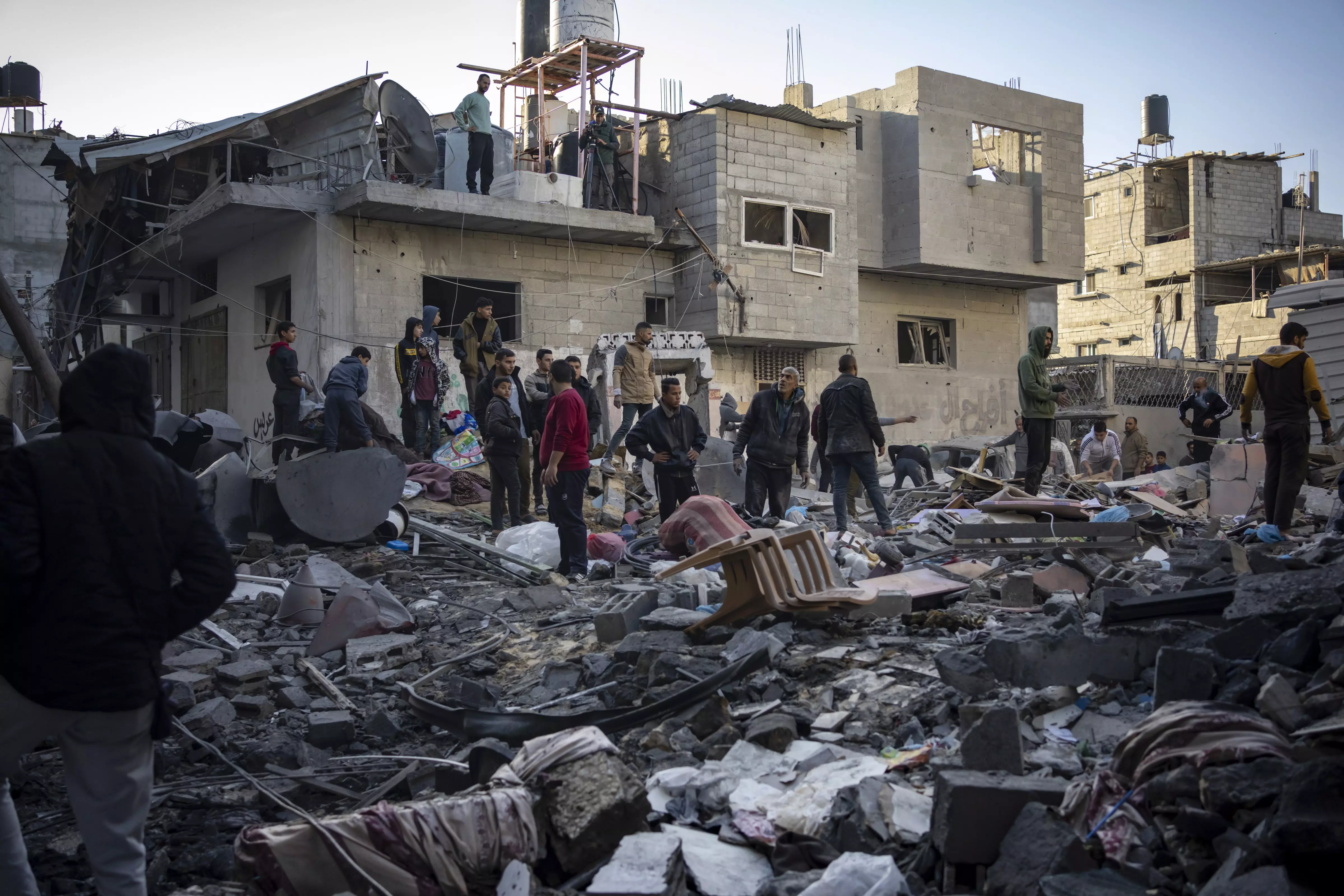
Israeli bombardment of the Gaza Strip in Rafah on Saturday, December 9. Photo: AP/PTI
Israel-Hamas war: Gaza death toll tops 17,700; Yemen rebels threaten ship traffic to Israel

Jerusalem, Dec 10 (AP) The Palestinian death toll in Gaza from the Israel-Hamas war has surpassed 17,700, around two-thirds of them women and children, according to the Health Ministry in the Hamas-controlled territory.
Israel's ground offensive in southern Gaza Strip intensified on Saturday with further airstrikes and artillery fire, a day after the United States blocked a UN resolution calling for a cease-fire.
Israel says 97 of its soldiers have died in the ground offensive after Hamas raided southern Israel on Oct. 7, killing about 1,200 people, mostly civilians, and taking about 240 hostages.
Amid concerns about a wider conflict, Iran-backed Houthi rebels in Yemen threatened to prevent any ship heading to Israeli ports from passing through the Red Sea and Arabian Sea until food and medicine can enter Gaza freely. With only a trickle of humanitarian aid reaching a small portion of Gaza, residents have reported severe food shortages.
Despite growing international pressure, President Joe Biden's administration remains opposed to an open-ended cease-fire, arguing it would enable Hamas to continue posing a threat to Israel. The administration approved the emergency sale to Israel of nearly 14,000 rounds of tank ammunition worth more than USD 106 million, the State Department said.
Currently: — US vetoes UN resolution backed by many nations demanding immediate humanitarian cease-fire in Gaza — Shadows of children:' For the youngest hostages, life moves forward in whispers — Bloodshed, fear, hunger, desperation: Palestinians try to survive war's new chapter in southern Gaza Here's what's happening in the war: HOUTHIS AIM TO BLOCK RED SEA SHIP TRAFFIC TO ISRAEL BEIRUT — Iran-backed Houthi rebels in Yemen threatened Saturday to prevent any ship heading to Israeli ports from passing through the Red Sea and the Arabian Sea until enough food and medicine are allowed into the Gaza Strip.
Iran-backed fighters in Lebanon, Syria, Iraq and Yemen have claimed responsibility for attacks on Israeli and US targets since the Israel-Hamas war broke out.
Over the past weeks, the Houthis have attacked several vessels in the Red Sea, as well as launching drones and missiles targeting Israel.
On December 3, ballistic missiles fired by the Houthis struck three commercial ships in the Red Sea, while a US warship shot down three drones in self-defense during the hourslong assault.
In November, the Houthis seized a vehicle transport ship linked to Israel in the Red Sea off Yemen. The rebels still hold the vessel near the port city of Hodeida.
Houthi military spokesman Brig. Gen. Yahya Saree said in a televised speech Saturday evening that all ships heading to Israel, no matter their nationality, will be a target unless aid is allowed to enter Gaza freely.
"We warn all ships and companies against dealing with Israeli ports,” Saree said. He said Houthis have no intention to interrupt international trade “except for the ships that carry products to Israeli ports." He said the decision goes into effect immediately.
AID GROUPS CALL FOR UN TO TRY AGAIN AT CEASE-FIRE RESOLUTION NEW YORK — The International Rescue Committee and seven other aid agencies have called for the UN Security Council to pass a resolution calling for an immediate cease-fire and the release of hostages held by Hamas.
The statement late Friday came hours after a similar Security Council cease-fire resolution was vetoed by the United States.
"This was a missed opportunity to stop the violence," said the joint statement by aid groups including Mercy Corps, Oxfam and Save the Children.
"The only way for civilian lives to be protected and for adequate humanitarian assistance to be provided is for the fighting to stop," the groups said.
ISRAELI AND GERMAN LEADERS DISCUSS WAR IN PHONE CALL BERLIN — Israeli Prime Minister Benjamin Netanyahu discussed the ground offensive in southern Gaza with German Chancellor Olaf Scholz in a phone call on Saturday, Scholz's office said.
The two leaders "spoke about the necessary efforts for the greatest possible protection of civilians and a substantial improvement of the humanitarian situation of people in the Gaza Strip," according to a statement.
It added that Scholz "stressed that more humanitarian aid must reach people in the Gaza Strip and this must happen on a reliable basis," and that the leaders discussed the situation in the West Bank and "acts of violence by settlers." The statement doesn't specify who initiated the call. AP

